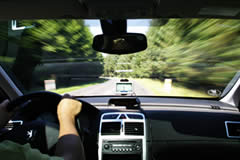Do My Driving Habits Affect My Gas Mileage? - Vol.241
If you've been looking to save money on gas, you might want to cut down on the speeding and evaluate the way you drive. Studies have found that poor driving habits can serious impact your wallet and cost you a lot of money in a just a short amount of time. One study done by the car manufacturer Toyota reported that getting rid of poor driving habits might even save you upwards of 25% on fuel costs per year.
You might be wondering just what constitutes 'poor driving habits' and how can you take advance of these fuel economy savings. Here are some of the worst driving habits that are affecting your gas mileage and how you can address those problems.

Slamming On The Gas
Drivers that like to treat stoplights like a race track could be sacrificing upwards of 33% of their fuel economy according to data provided by the U.S. EPA. When you force your car to go from a stand still speed to over 50 mph in less than 5 seconds, you are forcing the engine to exert a lot of force to make that a reality. Instead, watch the RPM meter and accelerate gradual. You should aim to accelerate 15 mph every 4-5 seconds for optimal fuel efficiency.
Slamming On The Brakes
Alternatively, if you like to slam on the brakes and come to sudden stops you could be doing just as much harm as someone like likes to rapidly accelerate; and most of the time, the two pair together. When you come to a sudden stop your vehicle will eventually have to pick up speed again to get moving. Rather than increasing the speed by 20-30mph on the highway, you are expecting your vehicle to increase the speed from 0-60mph and do that much more work.
Cruise Control
Cruise control can be convenient, but unless you live in a particularly flat region of the world, do the work and save the gas. Cruise control is intended to keep your car at a constant speed no matter what; therefore, it doesn't take into account the terrain or variations that might occur. If you have cruise control set a 65mph on the highway with your engine running at approximately 3,000 RPMs on the highway and you start to go up a hill, that engine is going to have to increase it's effort to 4,000 RPMs or more to make up for the difference. The higher you are running your engine, the more fuel that you are likely using.
Speeding
The faster you drive, the more gas you are going to be using to get your destination. You might be wondering why then the highway mileage on vehicles is usually higher than city mileage; the reason that is the case is because it takes more fuel to start a vehicle than it does to continue running it for long periods of time. Speeds up to 50 mph are generally okay and won't make much of a difference, but once you surpass that 50mph mark you will start to notice your gas mileage decrease.
A company named Automatic that collects data from private vehicle owners did a study on gas mileage and how it is effected by speed with a 2011 Subaru Outback. They found that after 50 mph, for every 10 miles you go you are loosing about 4mph in gas mileage.
Better Driving Is More Money In Your Pocket
The better you drive the more money you'll have to spend on other things in your life; however, if you just can't manage to slow down and give up a few extra minutes to get to your destination, you should probably consider investing in car with high initial gas mileage that can make up for the difference.